综合英语教程Unit3
研究生英语综合教程UNIT3课文及翻译(含汉译英英译汉)PDF版
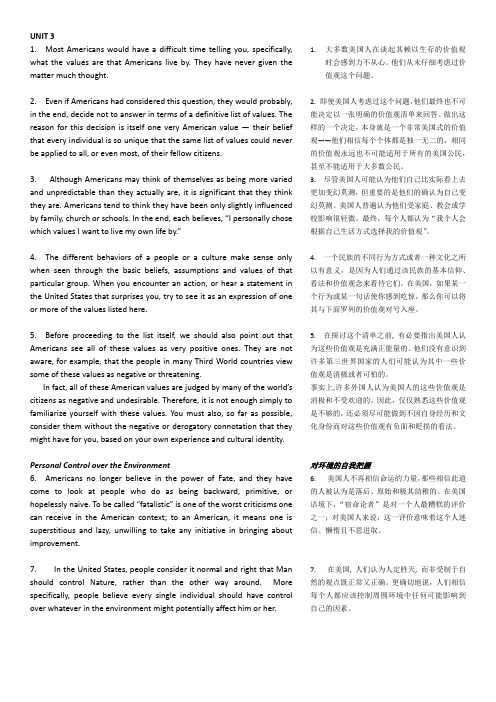
UNIT 31. Most Americans would have a difficult time telling you, specifically, what the values are that Americans live by. They have never given the matter much thought.2. Even if Americans had considered this question, they would probably, in the end, decide not to answer in terms of a definitive list of values. The reason for this decision is itself one very American value —their belief that every individual is so unique that the same list of values could never be applied to all, or even most, of their fellow citizens.3. Although Americans may think of themselves as being more varied and unpredictable than they actually are, it is significant that they think they are. Americans tend to think they have been only slightly influenced by family, church or schools. In the end, each believes, “I personally chose which values I want to live my own life by.”4. The different behaviors of a people or a culture make sense only when seen through the basic beliefs, assumptions and values of that particular group. When you encounter an action, or hear a statement in the United States that surprises you, try to see it as an expression of one or more of the values listed here.5. Before proceeding to the list itself, we should also point out that Americans see all of these values as very positive ones. They are not aware, for example, that the people in many Third World countries view some of these values as negative or threatening.In fact, all of these American values are judged by many of the world’s citizens as negative and undesirable. Therefore, it is not enough simply to familiarize yourself with these values. You must also, so far as possible, consider them without the negative or derogatory connotation that they might have for you, based on your own experience and cultural identity.Personal Control over the Environment6. Americans no longer believe in the power of Fate, and they have come to look at people who do as being backward, primitive, or hopelessly naive. To be called “fatalistic” is one of the worst criticisms one can receive in the American context; to an American, it means one is superstitious and lazy, unwilling to take any initiative in bringing about improvement.7. In the United States, people consider it normal and right that Man should control Nature, rather than the other way around. More specifically, people believe every single individual should have control over whatever in the environment might potentially affect him or her. 1.大多数美国人在谈起其赖以生存的价值观时会感到力不从心。
《全新版大学英语第2版综合教程》Unit 3 Text B 课文文本

全新版大学英语综合教程第4册Unit 3Text BHan Suyin was born in Beijing in 1917. Her father was a Chinese railway engineer and her mother a Dutch lady. She is a physician and the author of many works, including A Mortal Flower, which tells of the experiences of the author and her family, both in and out of China. This excerpt describes the author’s experience of looking for her first job in the early 1930s.A Mortal FlowerHan Suyin1.The day after meeting Hilda I wrote a letter to the Rockefeller Foundation, applying for a job.2. Neither Father nor Mother thought I would get in. “You have to have pull. It’s an American thing, Rockefeller Foundation. You must have pull. ”3.Mother said: “That’s where they do all those experiments on dogs and people. All the Big Shots of the Nanking government also came here to have medical treatment, and sometimes took away a nurse to become a new wife.”4. It made sense to me, typing in a hospital; I would learn about medicine, since I wanted to study medicine. And as there no money at home for me to study, I would earn money, and prepare myself to enter medical school. I had already discovered that a convent-school education was not at all adequate, and that it would take me at least three more years of hard study before being able to enter any college at all. Science, mathematics, Chinese literature and the classics... with the poor schooling given to me, it would take me years to get ready for a university.5. “I will do it,” But clenched teeth, decision tearing my bowels, were not enough; there was no money, no money, my mother said it, said it until I felt as if every scrap of food I ate was wrenched off my father’s body.6. “No one is going to feed you doing nothing at home.” Of course, one who does not work must not eat unless one can get married, which is called: “being settled at last.” But with my looks I would never get married; I was too thin, too sharp, too ugly. Mother said it, Elder Brother had said it. Everyone agreed that I should work, because marriage would be difficult for me.7. Within a week a reply came. The morning postman brought it, and I choked over my milk and coffee. “I’m to go for an interview. At the Peking Union Medical College. To the Comptroller’s office.”8. Father and Mother were pleased. Mother put the coffee pot down and took the letter. “What good paper, so thick.” But how could we disguise the fact that I was not [even] fifteen years old? I had claimed to be sixteen in the letter. In fact, said Papa, it was not a lie since Chinese are a year old when born, and if one added the New Year as an extra year, as do the Cantonese and the Hakkas, who became two years old when they reach their first New Year (so that a baby on December 31st would be reckoned two years old on the following January 2nd), I could claim to being sixteen.9. “You look sixteen,” said Mama; “all you have to do is to stop hopping and picking your pimples. And lengthen your skirt.”10. What dress should I wear? I had two school uniforms, a green dress, a brown dress, and one dress with three rows of frills for Sunday, too dressy for an interview. I had no shoes except flat-heeled school shoes, and tennis shoes. There was no time to make a dress and in those years no ready made clothes existed, so Mother lengthened the green dress. I squeezed two pimples on my forehead, then went to the East market and bought some face powder, Butterfly brand, pink, made in Shanghai by a Japanese firm.11. The next morning, straw-hatted, with powder on my nose, I went with my father to the gates of the hospital.12. “It’s not this gate, this is for the sick. It’s the other gate, round the corner,” said the porter.13. The Yu Wang Fu Palace occupied a whole city block. We walked along its high grey outer wall, hearing the dogs scream in the kennels, and came to its other gate, which was the Administration building gate. It had two large stone lions, one male, one female. We crossed the marble courtyard, walked up the steps with their carved dragons coiling in the middle, into an entrance hall, with painted beams and intricate painted ceiling, red lacquered pillars, huge lamps. There was cork matting on the stone floor.14. “I’ll leave you,” said Papa. “Try to make a good impression.” And he was gone.15. I found the Comptroller’s office easily; there was a messenger in the hall directing visitors. An open door, a room, two typewriters clattering and two women making them clatter.16. I stood at the door and one of the women came to me. She had new style of hair, all upstanding curls, which I admired, a dress with a print round the hem; she was very pregnant, so that he belly seemed to be coming at me first. She smiled. “Hello, what can I do for you?”17. “I have an interview.”18. She took the letter from my hand. “Glad you could come. Now, just sit you down. No, sit down there. I’ll tell Mr. Harned you’ve come.”19. The office had two other doors besides the one to the corridor, on one was “Comptroller.” That was the one she went through and returned from.20. “Mr. Harned will see you now.”21. Mr. Harned was very tall, thin, with a small bald head, a long chin, enormous glasses. I immediately began to quiver with fright. His head was like a temple on top of a mountain, like the white pagoda on the hill in the North Sea Park. I could not hear a word of what he said. A paper and a pencil were in my hand, however, and Harned was dictating to me, giving me a speed test in shorthand.22. I went out of his office and the pregnant secretary sat me in front of her own typewriter. I turned a stricken face to her, “I couldn’t hear. I couldn’t hear what he said...”23. “Wait, I’ll tell him.” She bustled off. At the other desk was a blonde, thin girl, who had thrown on look at me and then gone back to clattering. The pregnant one reappeared,a pink sheet in hand: “Now just copy this on the typewriter, best you can.”24. I hit the keys, swiftly; the typewriter was the same make as mine, a Royal.25. “My, you are fast. I’ll tell Mr. Harned.”26. And Mr. Harned came out, benigh behind those enormous goggle glasses. “Well, Miss Chou, we’ve decided to take you on as a typist, at thirty-five dollars a month. To start Monday. Is that all right?”27. I nodded, unable to speak. Had he said ten dollars I would have accepted.28. The kind secretary said: “Now take your time, and wipe your face. How old are you, by the way?”29. “Sixteen, nearly.”30. “Is that all? Why my eldest is bigger than you, and she isn’t through school yet. I told Mr. Harned you were shy and upset, and that’s why you couldn’t take dictation. He’s all right, just takes getting used to, that’s all.”31. “I couldn’t understand his English.”32. “Oh, you’ll get used to it. Now, I won’t be around on Monday, I’m going to havea baby. It’s your letter that got them interested in you, you wrote such good English, better than all the other letters we’ve had. Mr. Harned will give you a try.” Shewhispered, “I put in a good word for you.”33. “Thanks, thanks a lot, ... I need the money, I ...”34. “Yes, dear, we know.” Obviously she wanted her typewriter back, and her chair. I was still sitting on it. “Well, bye-bye for now; hope you enjoy yourself in this job. I’ve been here six months and I’ve enjoyed every minute. Don’t let Mr. Harned worry you; he’s really great, once you get used to him.”35. I had a job, had a job, had a job.。
新标准大学英语综合教程3unit3ppt课件

1. I’m getting more absent-minded as I get older.
随着年纪变大,我变得更健忘了。
2. She absent-mind她ed心ly不在pl焉ay地ed摆弄so梳me子上ha粘ir附s着w的hi几c根h 头发 clung to the comb.
3. She talked to the stranger while walking, as if absent-mindedly.
a. based on situations or events that seem
possible rather than on actual ones (基于)假
设的,假定的
e.g.
1. I don’t want to talk about hypothetical situations.
我不想谈论假设的情况。
wordsphrases她心不在焉地摆弄梳子上粘附着的几根头发她心不在焉地摆弄梳子上粘附着的几根头发11brainlessusingintelligence不必动脑筋的
Real Communication An Integrated Course
3 综合教程
制作
外语教学与研究出版社 版权所有
Words & Phrases
e.g. We hope for her sake that the wedding goes as
planned.
看在她的份儿上,我们希望婚礼按计划进行。
.
Words & Phrases
plane
n. [C] a level
of thought, development, or existence 层次;水
(完整版)全新版大学英语(第二版)综合教程3课文原文及翻译Until1-8较完整版
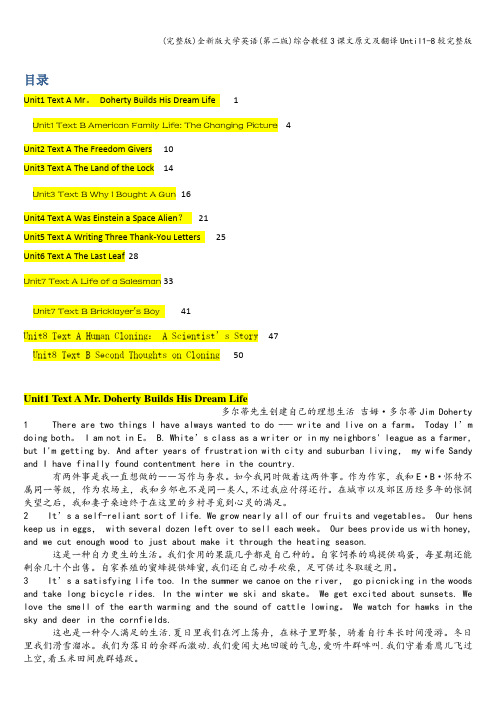
8 The next year we grew even more food and managed to get through the winter on firewood that was mostly from our own trees and only 100 gallons of heating oil. At that point I began thinking seriously about quitting my job and starting to freelance. The timing was terrible。பைடு நூலகம்By then, Shawn and Amy, our oldest girls were attending expensive Ivy League schools and we had only a few thousand dollars in the bank。 Yet we kept coming back to the same question: Will there ever be a better time? The answer, decidedly, was no, and so —— with my employer’s blessings and half a year’s pay in accumulated benefits in my pocket -- off I went.
全新版大学英语综合教程3各单元summary课本原文及翻译
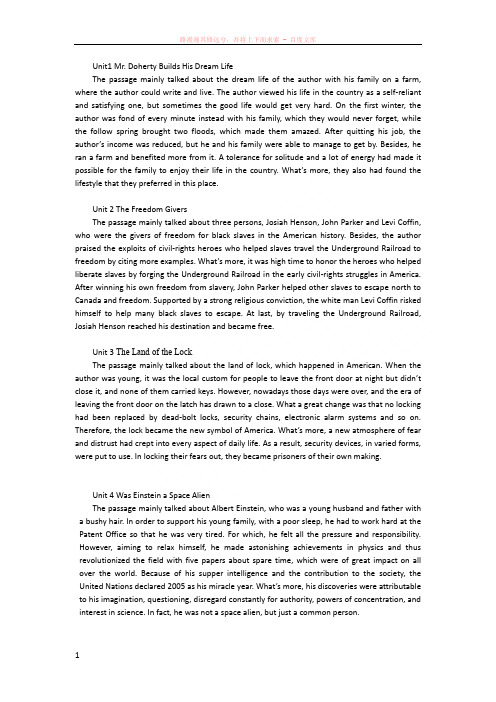
Unit1 Mr. Doherty Builds His Dream LifeThe passage mainly talked about the dream life of the author with his family on a farm, where the author could write and live. The author viewed his life in the country as a self-reliant and satisfying one, but sometimes the good life would get very hard. On the first winter, the author was fond of every minute instead with his family, which they would never forget, while the follow spring brought two floods, which made them amazed. After quitting his job, the author’s income was reduced, but he and his family were able to manage to get by. Besides, he ran a farm and benefited more from it. A tolerance for solitude and a lot of energy had made it possible for the family to enjoy their life in the country. What’s more, they also had found the lifestyle that they preferred in this place.Unit 2 The Freedom GiversThe passage mainly talked about three persons, Josiah Henson, John Parker and Levi Coffin, who were the givers of freedom for black slaves in the American history. Besides, the author praised the exploits of civil-rights heroes who helped slaves travel the Underground Railroad to freedom by citing more examples. What’s more, it was high time to honor the heroes who helped liberate slaves by forging the Underground Railroad in the early civil-rights struggles in America. After winning his own freedom from slavery, John Parker helped other slaves to escape north to Canada and freedom. Supported by a strong religious conviction, the white man Levi Coffin risked himself to help many black slaves to escape. At last, by traveling the Underground Railroad, Josiah Henson reached his destination and became free.Unit 3 The Land of the LockThe passage mainly talked about the land of lock, which happened in American. When the author was young, it was the local custom for people to leave the front door at night but didn’t close it, and none of them carried keys. However, nowadays those days were over, and the era of leaving the front door on the latch has drawn to a close. What a great change was that no locking had been replaced by dead-bolt locks, security chains, electronic alarm systems and so on. Therefore, the lock became the new symbol of America. What’s more, a new atmosphere of fear and distrust had crept into every aspect of daily life. As a result, security devices, in varied forms, were put to use. In locking their fears out, they became prisoners of their own making.Unit 4 Was Einstein a Space AlienThe passage mainly talked about Albert Einstein, who was a young husband and father with a bushy hair. In order to support his young family, with a poor sleep, he had to work hard at the Patent Office so that he was very tired. For which, he felt all the pressure and responsibility. However, aiming to relax himself, he made astonishing achievements in physics and thus revolutionized the field with five papers about spare time, which were of great impact on all over the world. Because of his supper intelligence and the contribution to the society, the United Nations declared 2005 as his miracle year. What’s more, his discoveries were attributable to his imagination, questioning, disregard constantly for authority, powers of concentration, and interest in science. In fact, he was not a space alien, but just a common person.Unit 5 Three Thank-You LettersThe passage mainly talked about the author’s three special letters, by which he wanted to celebrate the true meaning of Thanksgiving. On Thanksgiving Day 1943, as a young coastguardsman at sea, he worked as a cook. While he was going to think about Thanksgiving, he came up with the idea of expressing his gratitude to people who had helped him before. Therefore, he wrote three thank-you letters to three persons, his father, the Rev. Nelson and his grandmother. At a mail call, he got three letters in reply, which drove him to think deeply. After he retired from the Coast Guard, he still never forgot these letters which gave him an insight into expressing appreciation for one’s efforts. Furthermore, he wished everyone to find the good and then praise it.Unit 6 The Last LeafThe passage mainly talked about the last leaf, which Johnsy gave a sight to after she got the pneumonia and lived in the hospital. She looked out the window and counted the leaves on an old ivy vine. Furthermore, she made up her mind to end her life when the last leaf fell. When she saw the last leaf still cling to the vine after two nights’ rain and wind, she decided not to give up her life. In fact, the last leaf, called a masterpiece by Behrman who risked his life painting it there the night that the last leaf fell, was actually painted onto the wall. However, because it looked so real that she could have never imagined that it was faked. In a deeper sense, it saved her life.unit 1 Mr. Doherty Builds His Dream LifeIn America many people have a romantic idea of life in the countryside. Many living in towns dream of starting up their own farm, of living off the land. Few get round to putting their dreams into practice. This is perhaps just as well, as the life of a farmer is far from easy, as Jim Doherty discovered when he set out to combine being a writer with running a farm. Nevertheless, as he explains, he has no regrets and remains enthusiastic about his decision to change his way of life.在美国,不少人对乡村生活怀有浪漫的情感。
全新版大学英语(第二版)综合教程3Unit3一课一练
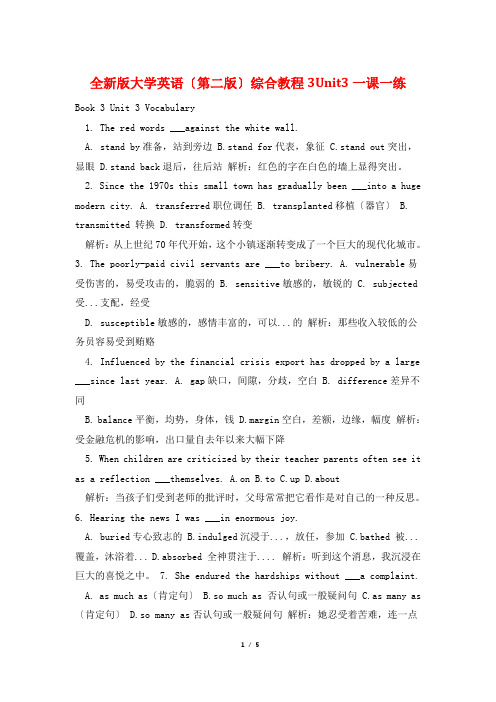
全新版大学英语〔第二版〕综合教程3Unit3一课一练Book 3 Unit 3 Vocabulary1. The red words ___against the white wall.A. stand by准备,站到旁边B.stand for代表,象征C.stand out突出,显眼 D.stand back退后,往后站解析:红色的字在白色的墙上显得突出。
2. Since the 1970s this small town has gradually been ___into a huge modern city. A. transferred职位调任 B. transplanted移植〔器官〕 B. transmitted 转换 D. transformed转变解析:从上世纪70年代开始,这个小镇逐渐转变成了一个巨大的现代化城市。
3. The poorly-paid civil servants are ___to bribery. A. vulnerable易受伤害的,易受攻击的,脆弱的 B. sensitive敏感的,敏锐的 C. subjected 受...支配,经受D. susceptible敏感的,感情丰富的,可以...的解析:那些收入较低的公务员容易受到贿赂4. Influenced by the financial crisis export has dropped by a large ___since last year. A. gap缺口,间隙,分歧,空白 B. difference差异不同B. balance平衡,均势,身体,钱 D.margin空白,差额,边缘,幅度解析:受金融危机的影响,出口量自去年以来大幅下降5. When children are criticized by their teacher parents often see it as a reflection ___themselves. A.on B.to C.up D.about解析:当孩子们受到老师的批评时,父母常常把它看作是对自己的一种反思。
大学英语综合教程3unit3
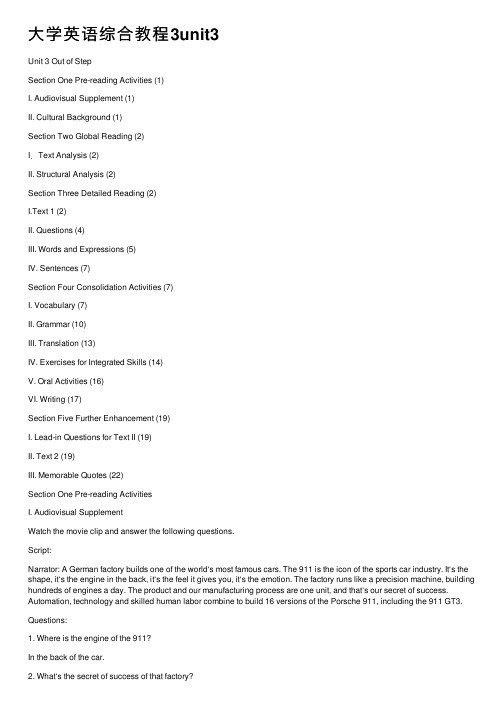
⼤学英语综合教程3unit3Unit 3 Out of StepSection One Pre-reading Activities (1)I. Audiovisual Supplement (1)II. Cultural Background (1)Section Two Global Reading (2)I.Text Analysis (2)II. Structural Analysis (2)Section Three Detailed Reading (2)I.Text 1 (2)II. Questions (4)III. Words and Expressions (5)IV. Sentences (7)Section Four Consolidation Activities (7)I. Vocabulary (7)II. Grammar (10)III. Translation (13)IV. Exercises for Integrated Skills (14)V. Oral Activities (16)VI. Writing (17)Section Five Further Enhancement (19)I. Lead-in Questions for Text II (19)II. Text 2 (19)III. Memorable Quotes (22)Section One Pre-reading ActivitiesI. Audiovisual SupplementWatch the movie clip and answer the following questions.Script:Narrator: A German factory builds one of the world‘s most famous cars. The 911 is the icon of the sports car industry. It‘s the shape, it‘s the engine in the back, it‘s the feel it gives you, it‘s the emotion. The factory runs like a precision machine, building hundreds of engines a day. The product and our manufacturing process are one unit, and that‘s our secret of success. Automation, technology and skilled human labor combine to build 16 versions of the Porsche 911, including the 911 GT3.Questions:1. Where is the engine of the 911?In the back of the car.2. What‘s the secret of success of that factory?The product and their manufacturing process are one unit. Automation, technology and skilled human labor combine to build the Porsche 911. And the factory runs like a precision machine.II. Cultural Background1. Car culture has been a major niche lifestyle in America.2. In the 1950s, the post-war boom produced a generation of teenagers with enough income to buy their own cars. These cars became so much more than just modes of transportation. They were reflections of a lifestyle. The ability to tune and soup-up muscle cars gave average Joes the opportunity to show off their power, their speed and their style in a way that personified the car as character.3. Like Granny in Jan and Dean's 1964 song ―The Little Old Lady from Pasadena,‖ we can't keep our foot off the accelerator.4. We are crazy about our cars —and always have been. ―The American,‖William Faulkner lamented in 1948, ―really loves nothing but his automobile.‖5. We dream of cars as we dream of lovers.6. Americans have always cherished personal freedom and mobility, rugged individualism and masculine force.Section Two Global ReadingI.Text AnalysisMain Idea―Out of Step‖ is an exposition that presents the absurdity of the Americans‘ dependence on cars. The Americans, being so accustomed to using cars, have almost forgotten the existence of their legs. Wherever they go, they go in their cars. As a result, pedestrian facilities are neglected in city planning or rejected by the inhabitants.II. Structural AnalysisParagraph 1-6 The writer introduces his idea with an anecdote.Paragraphs 7-13 In this part, the author presents the fact that the Americans are habituated to using cars for everything. Paragraphs 14-20 In this part, the author explains that pedestrian facilities are neglected or discarded.Section Three Detailed ReadingI.Text 1Out of StepBill Bryson1After living in England for 20 years, my wife and I decided to move back to the United States. We wanted to live in a town small enough that we could walk to the business district, and settled on Hanover, N.H., a typical New England town —pleasant, sedate and compact. It has a broad central green surrounded by the venerable buildings of Dartmouth College, an old-fashioned Main Street and leafy residential neighborhoods.2It is, in short, an agreeable, easy place to go about one‘s business on foot, and yet as far as I can tell, virtually no one does.3Nearly every day, I walk to the post office or library or bookstore, and sometimes, if I am feeling particularly debonair, I stop at Rosey Jekes Caféfor a cappuccino. Occasionally, in the evenings, my wife and I stroll up to the Nugget Theatre for a movie or to Murphy‘s on the Green for a beer, I wouldn‘t dream of going to any of these places by car. People have gotten used to my eccentric behavior, but in the early days acquaintances would often pull up to the curb and ask if I wanted a ride.4―I‘m going your way,‖ they would insist when I politely declined. ―Really, it‘s no bother.‖5―Honestly, I enjoy walking.‖6―Well, if you‘re sure,‖ they would say and depart reluctantly, even guiltily, as if leaving the scene of an accident without giving their name.7In the United States we have become so habituated to using the car for everything that it doesn‘t occur to us to unfurl our legs and see what those lower limbs can do. We have reached an age where college students expect to drive between classes, where parents will drive three blocks to pick up their children from a friend‘s house, where the letter carrier takes his van up and down every driveway on a street.8We will go through the most extraordinary contortions to save ourselves from walking. Sometimes it‘s almost ludicrous. The other day I was waiting to bring home one of my children from a piano lesson when a car stopped outside a post office, and a man about my age popped out and dashed inside. He was in the post office for about three or four minutes, and then came out, got in the car and drove exactly 16 feet (I had nothing better to do, so I paced it off) to the general store6 next door.9And the thing is, this man looked really fit. I‘m sure he jogs extravagant distances and plays squash and does all kinds of healthful things, but I am just as sure that he drives to each of these undertakings.10An acquaintance of ours was complaining the other day about the difficulty of finding a place to park outside the local gymnasium. She goes there several times a week to walk on a treadmill. The gymnasium is, at most, a six-minute walk from her front door.11I asked her why she didn‘t walk to the gym and do six minutes less on the treadmill.12She looked at me as if I were tragically simple-minded and said, ―But I have a program for the treadmill. It records my distance and speed and calorie burn rate, and I can adjust it for degree of difficulty.‖13I confess it had not occurred to me how thoughtlessly deficient nature is in this regard.14According to a concerned and faintly horrified 1997 editorial in the Boston Globe, the United States spent less than one percent of its transportation budget on facilities for pedestrians. Actually, I‘m surprised it was that much. Go to almost any suburb developed in the last 30 years, and you will not find a sidewalk anywhere. Often you won‘t find a single pedestrian crossing.15I had this brought home to me one summer when we were driving across Maine and stopped for coffee in one of those endless zones of shopping malls, motels, gas stations and fast-food places. I noticed there was a bookstore across the street, so I decided to skip coffee and head over.16Although the bookshop was no more than 70 or 80 feet away, I discovered that there was no way to cross on foot without dodging over six lanes of swiftly moving traffic. In the end, I had to get in our car and drive across.17At the time, it seemed ridiculous and exasperating, but afterward I realized that I was possibly the only person ever to have entertained the notion of negotiating that intersection on foot.18The fact is, we not only don‘t walk anywhere anymore in this country, we won‘t walk anywhere, and woe to anyone who tries to make us, as the city of Laconia, N.H., discovered. In the early 1970s, Laconia spent millions on a comprehensive urban renewal project, which included building a pedestrian mall to make shopping more pleasant. Esthetically it was a triumph —urban planners came from all over to coo and take photos--but commercially it was a disaster. Forced to walk onewhole block from a parking garage, shoppers abandoned downtown Laconia for suburban malls.19In 1994 Laconia dug up its pretty paving blocks, took away the tubs of geraniums and decorative trees, and brought back the cars. Now people can park right in front of the stores again, and downtown Laconia thrives anew.20And if that isn‘t sad. I don‘t know what is.II. Questions1)What kind of town is it? (Paragraph 1)It is a small, pleasant and agreeable town. The inhabitants are friendly and willing to help.But although the town is compact, few people go about on foot.2)What is considered the author‘s ―eccentric behavior‖? (Paragraph 3)Instead of riding a car, the author walks around the city, doing his shopping, going to themovies or visiting the café or bar. To people who are used to going everywhere in a car, he is an eccentric.3)Why would drivers ―depart reluctantly, even guiltily‖when their offer was declined?(Paragraphs 3-6)With cars becoming the basic essentials of their life, people are so habituated to using the car for everything. The scene of somebody walking around seemed so unusual to them that they would naturally show their concern to him. When their offer to give him a ride was declined, they were sorry for not being able to help him out.4) Why did the author say ―Actually, I‘m surprised it was that much‖? (Paragraph 14)When the author found that the newly planned suburbs totally overlooked pedestrian needs, he assumed there was no budget for pedestrian facilities at all. So he says he was surprised to learn that there actually was less than one percent of budget on it. Here the author writes with a touch of irony.5) Why did Laconia change its downtown pedestrian mall to one with parking lots? (Paragraphs18-19)Although the pedestrian mall was well decorated, shoppers were unwilling to walk to the stores from a parking garage. As a result, it was a commercial failure. The government had to compromise with the public preference.Class ActivityGroup discussion: What does the title mean?With the use of this title, the writer seems to suggest1. people no longer walk in America;2. the few people who do walk seem to be old-fashioned and ―eccentric‖.III. Words and ExpressionsParagraphs 1-6sedate a. calm, serious and formale.g. She is a sedate old lady; she is caring but never talks much.The fight against a nuclear power station site has transformed a normally sedate town into a battlefield.v. make calm or sleepy, esp. with a druge.g. The patient was heavily sedated and resting quietly in bed.Derivation: sedately (ad.), sedation (n.), sedative (a., n.)eccentric a.(of people or behavior) unconventional and slightly strangee.g. The old gentleman, who lived alone all his life, was said to have some eccentric habits.n. a person of unconventional and slightly strange views or behaviore.g. The old gentleman enjoyed a colorful reputation as an engaging eccentric.curb n. (British English: kerb) a line of raised stones separating the footpath from the road v./ n. ( place) a control or limit on sth. undesirablee.g.Poor nutrition can curb a child‘s development both physically and mentally.There will be now curbs on drunk-driving from next month.Paragraphs 7-12habituate v. accustom by frequent repetition or prolonged exposuree.g. You must habituate yourself to reading aloud.By the end of the school term, the students had been habituated / accustomed / used to rising at five o‘clock.contortion n. a twisted position or movement that looks surprising or strangee.g. The spectators cannot but admire the contortions of the gymnasts.Derivation: contort v. cause sth. to twist out of its natural shape and looks strange or unttractive Comparison: distort, twist, deform, contort & warpThese verbs mean to change and spoil the form or character of sth.distortTo distort is to alter in shape, as by torsion or wrenching; the term also applies to verbal or pictorial misrepresentation and to alteration or perversion of the meaning of sth.e.g. The human understanding is like a false mirror, which, receiving rays irregularly distorts and discolors the nature of things by mingling its own nature with it. (Francis Bacon).twistTwist applies to distortion of form or meaning.e.g. a mouth twisted with painHe accused me of twisting his words to mean what I wanted them to.deformIf you deform sth., or if it deforms, its usual shape changes so that its usefulness or appearance is spoiled.e.g. Great erosion deformed the landscape.The earlier part of his discourse was deformed by pedantic divisions and subdivisions.contortIf you contort sth., or if it contorts, it twists out of its normal shape and looks strange or unattractive.e.g. a face contorted with rage;a contorted line of reasoning.warpWarp can refer to a turning or twisting from a flat or straight form.e.g. The floorboards had warped over the years.It also can imply influencing sb. in a way that has a harmful effect on how they think or behave.e.g. Prejudice warps the judgment.Paragraphs 13-20bring sth. home to sb.: make sb. realize sth.e.g.The news report has brought home to us all the plight of the prisoners of war.Comparison: drive sth. home to sb., hit / strike homedrive sth. home to sb.: make sb. realize sth., esp. by saying it often, loudly, angrily, etc.e.g. The professor drove home to them that they must finish the writing assignment by Friday.hit / strike home: (of remarks, etc.) have the intended (often painful) effecte.g. You could see from his expression that her sarcastic comments had hit/stricken home.entertain v. consider an idea, etc. or allow yourself to think that sth. might happen or be truee.g. He refused to entertain our proposal.entertain ideas, doubts, etcnegotiate v.get over or past (an obstacle, etc.) successfully; manage to travel along a difficult routee.g. The only way to negotiate the path is on foot.Frank Mariano negotiates the dessert terrain in his battered pickup.Practice那攀登者得攀越⼀陡峭岩⽯。
上海交大版应用型大学英语综合教程 第3册 unit 3课文翻译与答案
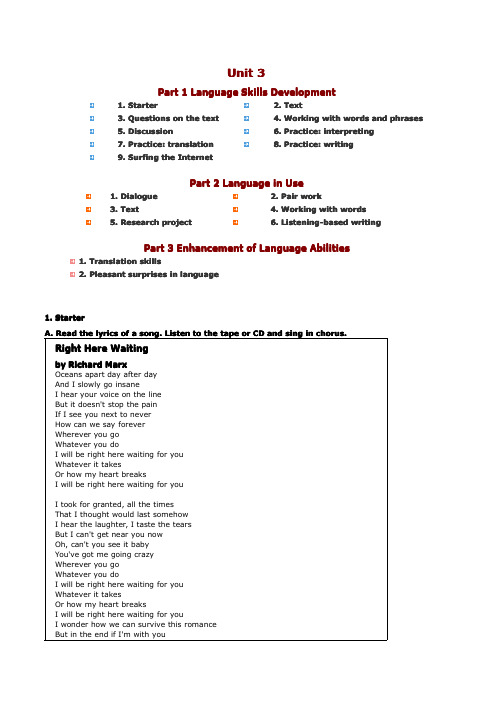
And you," she turned to George, "you are making your 非安家吗?不打算回英国了?”
home in this country? You do not intend to return to
5 听说乔治已经在我们农场附近买
England just yet?"
Cape Town became a British colony in 1806. European settlement expanded during the
1820s as the Boers (Original Dutch, Flemish, German and French Settlers.) and the British Settlers claimed land in the north and east of the country. Within the country, anti-British policies among white South Africans focused on independence. South Africa achieved its political independence in 1961 when it was declared a republic. In 1994 South Africa held its first democratic election. Nelson Mandela and the African National Congress (ANC) came to power, and the country rejoined the Commonwealth of Nations.
- 1、下载文档前请自行甄别文档内容的完整性,平台不提供额外的编辑、内容补充、找答案等附加服务。
- 2、"仅部分预览"的文档,不可在线预览部分如存在完整性等问题,可反馈申请退款(可完整预览的文档不适用该条件!)。
- 3、如文档侵犯您的权益,请联系客服反馈,我们会尽快为您处理(人工客服工作时间:9:00-18:30)。
3. the past perfect
LSP
i. Structure:…had done…
ii. Meaning:the past perfect is used when an action
or state had stopped before a past time or action
(finished); the past perfect is also used when an
I’m sorry, but it’s first time that I have made so silly mistakes.
It/This/That is the first/second…/last time (that) …have done… It /This/That was the first/ second st time (that) …had done…
e.g. It was the first time she had been at a summer school and she thoroughly enjoyed it.
2. the past progressive
LSP
i. Structure
1) …was (were) doing…, while…was (were)
It/This/That is/was sb’s first/second…/last time to do… *** It is (high) time that… ???
• It is (high) time that (past tense of verbs are used in the sub-clause or should + verb, should cannot be omitted) (subjunctive mood)
words:contest, game, play, sport, tourney, etc.) e.g.
city. A. has been B. was C. came D. had been It was the third time______we had done the experiment. A. since B. before C. which D. that This is the second time______he has been out with
I had been walking for 8 days when we
arrived.
• difference • I have eaten the apples. • I aten holiday
• 2) take part in a chess tournament • 3) tournament n. 比赛;竞赛;锦标赛. (related
• It is time that the children went to bed.
• It is high time that the children should go to bed.
• It was about time that the children should go to bed.
doing…
2) 2) when…did…was (were) doing…
ii. Meaning:过去进行时常用来表示两个动作在过 去某一时间里同时进行或某一动作在过去某 一时间点正在进行。
e.g. What were the Class Three students doing while the Class One students were having a Chinese lesson? When I got up this morning, it was raining.
e.g. It is the first time that I’ve heard Jazz.
It will be the second time (that) he has
climbed that mountain.
Note:It was the first/ second/ etc. time that…(The past perfect过去完成should be used in the clause.)
her alone. A. that B. after C. when D. since
Translation: 1.那时我很幸运,因为那是我第三次访问中国了。
I was lucky then because it was the third time that I had visited China. 2.我很抱歉,但这是我第一次犯这么低级的错误。
• It’s time for the children to go to bed.
1. the present perfect
LSP
i. It is/ will be the first/ second/ etc. time that…
have/ has done…
ii. Meaning:It is sb’s first time to do sth.
action or state had begun before a past time or
action, but it would still go on (unfinished).
e.g. Tom flew home, but his father had already
died.
By six they had worked for 12 hours.
• 这是我第一次徒步去丹霞山旅行。 • 那是我第一次利用假期组织晚会。
It is the first time that she ____ before a crowd. A. has performed B. performs C. performed D. had performed That was the first time that the old man_____in this
